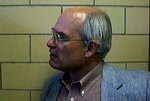Recently, Matthew Nisbet and Dietram Scheufele expanded on this thought in an article online. That article, "The facts never speak for themselves, which is why scientists need to "frame" their messages to the public," looks at science and how its methods and results are communicated by scientists and the media to the public.
They define framing as a way to "tailor messages in ways that make them personally relevant and meaningful to different publics." They argue that the older model of science, the popular science model, assumes "that the facts will speak for themselves and will win out, with no attention to how the facts are presented." We don't agree with popular science model either.
Here are some of the frames they identified in their research on science communication:
- morality/ethics
- social progress
- racing to find a cure
- economic competitiveness
- brain drain
- Pandora's box
- high tech inspired by nature
- asbestos
- Frankenfood
As a "first step" they suggest that scientists must learn to be better spokespersons for their work. Scientific leaders, especially, must lead the way. They are the ones in positions that can effect positive change the quickest. They also suggest greater public dialog about science. However, they are not optimistic that great numbers of the public will attend such meetings.
They praise, E. O. Wilson's book, An Appeal to Save Life on Earth, because he frames his arguments scientifically, personally, and morally. That multiple framing, they say, has led to religious audiences reading and discussing his book.
They cite reasons why science and its results fare are so poorly communicated. People pay more attention to sources that confirm what they already believe. New and expanding media outlets such as the Internet and television offer the potential for better informing the public, yet paradoxically, they are not used by the public. Instead, only a small minority tune in to content about science. They rest look elsewhere.
They give specific examples of well known and little known instances of science and framing. Among the well known are evolution vs. intelligent design and stem cell research. Less well known (in the United States, but not in Europe) are plant biotechnology and nanotechnology.
As stated in the beginning, we agree with Nisbet and Scheufele. Scientists must be advocates for their data. We would add, that another strategy toward this goal is to teach budding scientists, from the outset, that the data do not speak for themselves.



No comments:
Post a Comment